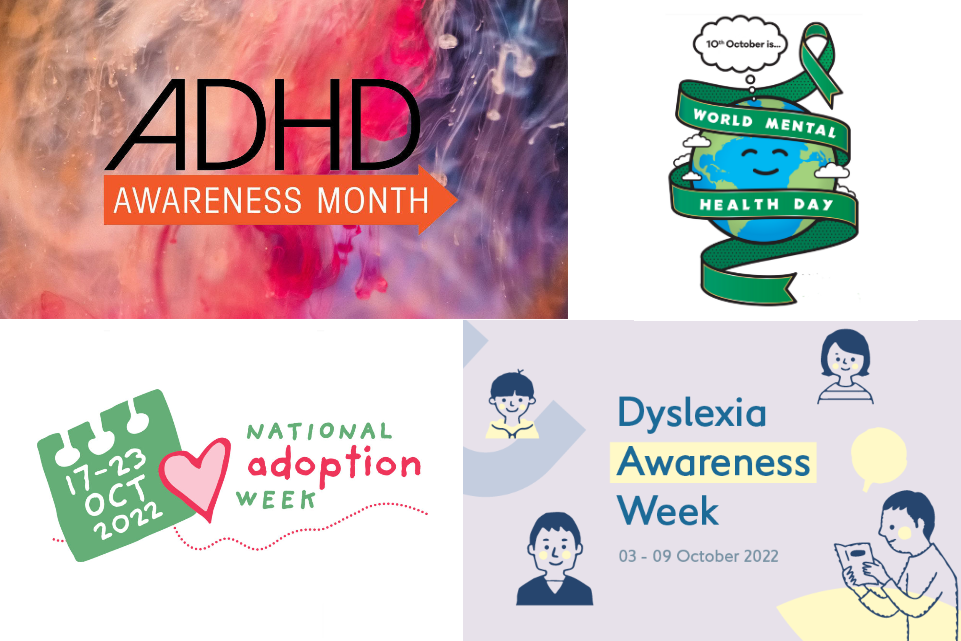
by Staff writer
ADHD month 2022 – Challenging our understanding of ADHD
Among many other things, October is recognised as ADHD awareness month, an opportunity to develop conversation and deepen understanding across social media and in person about Attention Defecit Hyperactivity Disorder. In particular, the theme that’s been chosen for this year’s awareness month is understanding a shared experience.
This is the last entry in our series of micro articles for October about several different awareness campaigns happening over the month. As with the previous posts, our contributions to the current discourse is connected by the theme of recognising accessibility needs for marginalised groups of the population, as well as actionable steps to address these. So far we have addressed the access needs of Dyslexia, complex mental health issues and adoptive children suffering the lingering effects of developmental trauma.
If you are only now beginning the series here, you might want to read our first article, where we outline this in greater depth.
How is ADHD defined?
Though many more people are familiar with the term at this point in time than in previous decades, there is also an ever widening breadth of interpretations that any given person may have of what ADHD is, how it presents and how to accomodate and support it. A lot of this can be attributed to the different contexts in which any given person has encountered ADHD, such as only being aware of it practically within the scope of special needs accomodations for young boys at primary school, with no frame of reference for how it is experienced and expressed by people in other demographics.
On of the main challenges that we often run into both in recognising and subsequently acting upon the presence of ADHD is that the symptoms by which it is defined share some significant overlap with several other existing recognised disorders and mental health issues. As a result, it can be possible for misdiagnosis or misunderstanding to occur, where the presence of certain aspects of ADHD are taken as a uniform indication that certain blanket interventions or forms of support are necessary and/or fully sufficient for treatment of that condition, regardless of an individual’s actual needs.
How does ADHD overlap?
Perhaps the main reason for this is the location of ADHD’s clinical definition within a prescriptive model of diagnostic pathology. When the range of needs we associate with ADHD are conceptualised as a syndrome based in quantifiable symptoms and types of observable behaviour, this limits the scope of clinicians to provide insightful help but also complicates the definitions themselves where those quantifiers are shared by other diagnoses or conflicting diagnostic frameworks.
In practice, very few of the symptoms used to diagnose ADHD are in isolation, exclusive to ADHD. As a result, where a client of the person performing this diagnosis might actually benefit more from forms of support that are associated with treating ASD, SPD, complex trauma, etc. this is unlikely to be made practically accessible over the established prescribed forms of treatment.
It doesn’t help matters that many of these symptoms are invisible or poorly understood, and can be deeply impractical for any external assessor to accurately diagnose within the context of a limited assessment, regardless of familiarity or expertise. As such, more so than most care needs, there is a significant risk of important information being missed or misintepreted, to the direct detriment of those who are in need of this support.
In fact, it’s worth addressing that one area in which people with all these overlapping diagnoses are similar is in ways that they experience reception from others. Across the board, the most significant issue is typically the callousness, dismissal and systemic marginalisation that these people are subjected to.
What is the alternative?
As raised in previous discussions, there is a way to reframe these issues through a common framework of meeting access needs. There is an argument to be made (one that is being put forward increasingly often at the moment) to make considerations for recognising a person’s indivudual experiences and challenges and approach them accordingly with an aim to meet their unique needs and figure out what tools and techniques are going to provide a meaningful benefit and support to their lived experience.
I.e. whether a person’s symptoms are likely to be diagnosed as ADHD or not, all of the different techniques used to support it are things that different people tend to find helpful for different reasons. Some of them may genuinely be applicable and deeply necessesary for their quality of life.
What’s next?
That concludes our October series of posts. Hopefully, it’s given you or those you may have shared this with plenty to reflect on or a fresh perspective on some very important topics.
If anything you’ve read has left you feeling that you would like to get in touch with us to raise some questions directly about the services we provide, please contact us on 01282 685345 or at office@jsapsychotherapy.com


